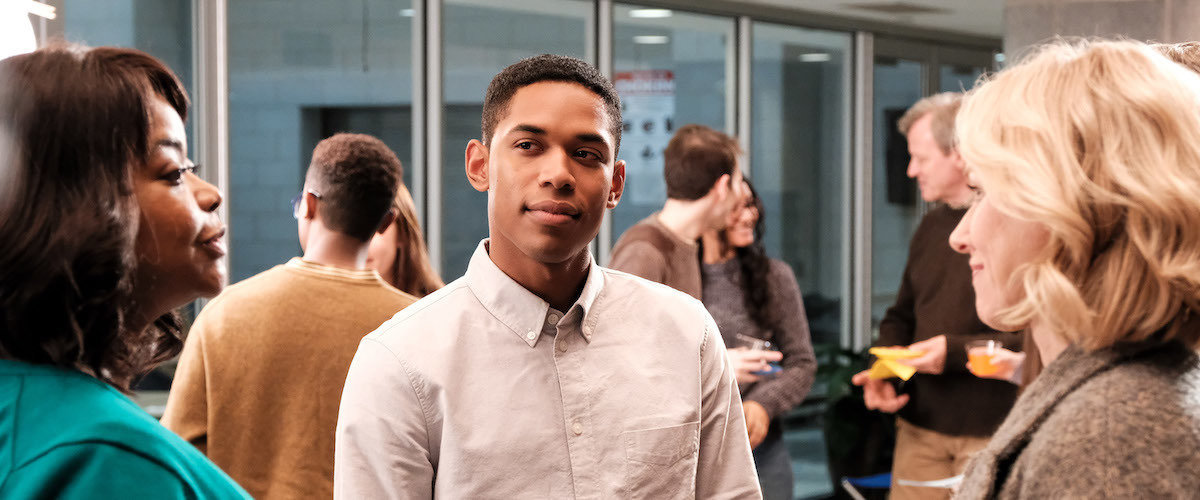Movie Info
Movie Info
- Director
- Julius Onah
- Run Time
- 1 hour and 48 minutes
- Rating
- R
VP Content Ratings
- Violence
- 2/10
- Language
- 2/10
- Sex & Nudity
- 1/10
- Star Rating
Relevant Quotes
Put no trust in a friend,
have no confidence in a loved one…

Julius Onah’s drama offers a very different perspective from the usual social justice film on interracial relations in post-Obama America. The two main black characters, 17-year-old student Luce (Kelvin Harrison, Jr.) and dedicated teacher Mrs. Wilson (Octavia Spencer), normally would be allied, but in this murky tale they become staunch adversaries. J.C. Lee’s script, based on his 2016 off-Broadway play, will leave you never certain as to who is right in the conflict.
The well-off Amy and Peter (Naomi Watts, Tim Roth) adopted the Eritrean boy, whom they symbolically named Luce (because they could not pronounce his African name), derived from the Latin for “light,” and saw him through years of therapy to overcome the trauma of having been forced to be a boy soldier during that unhappy nation’s civil war. Luce has emerged as a strong, hardworking teenager looked up to by virtually every faction of his suburban Virginia high school. Captain of his debate team and sports hero, he is slated to be class valedictorian.
However, one of his teachers, Harriet Wilson (Octavia Spencer), is upset when she reads his essay in which he praises the Pan-Africanist writer Frantz Fanon, who advocated violence to defeat colonization. Her unease turns to alarm when she searches his locker and finds a bag of outlawed fireworks, suggesting that he might be on the verge of attacking the school. (Later we learn that before this she had invaded a student’s locker, that of a teammate of Lucas. Finding marijuana, this had led to the boy’s ejection from the basketball team and the end of his promised college scholarship. The boy has dropped out of school and seems fated for a dismal future.)
Instead of confronting her student, the teacher meets with the parents without telling the him. She turns the bag over to the parents in the expectation that they will deal with the situation. They do not inform Luce of the meeting, but instead talk with him about other matters.
Throughout the film there is a lot of back and forth discussion about adopting a minority child, the irrational punishment of drug possession, race and racial expectations and relations, as well as trust between parents and children, and teachers and students. For most of the film we are not sure whom to root for. There is raised even the issue of jock rape, with Luce’s ex-girlfriend Stephanie Kim (Andrea Bang), possibly having been assaulted by Luce’s teammates—Miss Wilson had even used the girl’s plight in a class session as an example in which women needed to stand up for their rights.
Because it is Octavia Spencer playing Ms. Wilson, we might think of the long line of noble teacher inspiring student films, going back to those played by Sidney Poitier. Is she such a teacher, or a woman under pressure, striking out at others because of her drug-addicted sister (Marsha Stephanie Blake)—still another subplot?
In a culture paying lip service to Dr. King’s non-violence, why would Luce advocate violence to overcome oppression? Were those fireworks, capable of inflicting considerable damage were they to be set off indoors, really stashed in Luce’s locker as a favor to his friends, as he claims? And if Luce did not smear racist epithets on the front of Ms. Wilson’s house out of spite, who did?
Luce himself shows signs of struggle behind his façade of the perfect overachieving student, touted as an inspirational role model for other black males. No doubt he winces when some other students call him “Obama” and “Mandela.” Is this sincere admiration, or does it mask envy and resentment? Several times he chafes over the way he is regarded, declaring, “I’m not going to be somebody’s symbol.” And yet that is who he is in eyes of everyone, Ms. Wilson being the exception.
Some of the film is hard to accept—that in an upper-class school where parents and students are well aware of rights, a teacher could get away with searching a student’s locker on her own authority! And a parent not calling her on it? And why would she turn over the evidence of the boy’s potential violence to those likely to discard it? Also, one might wonder why Luce’s past trauma as a child soldier is just mentioned, with there seeming to be no trace of it in his present, no hint of a bad dream or a reaction to loud a noise? Those therapists must have been miracle workers.
The cast is so good that it is easy to miss the plot flaws. We have been treated with so many social justice films the past few years that we might too easily welcome another one promising to probe deeply into racism. This one could indeed lead to a great discussion of race and expectations, but the depth will have to come from the participants, not this film.
This review will be in the October issue of VP along with a set of questions for reflection and/or discussion. If you have found reviews on this site helpful, please consider purchasing a subscription or individual issue in The Store.

